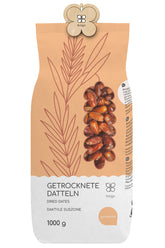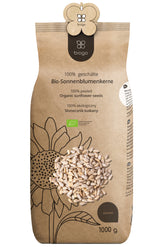Walnuts are not only a delicious snack but also a true powerhouse of nutrients. In this blog post, you'll learn why walnuts should be a fixed component of a balanced and healthy diet.
The nutritional values of walnuts
Walnuts are rich in high-quality fats, proteins, fiber, vitamins, and minerals. Particularly noteworthy are the omega-3 fatty acids, which are present in walnuts in a considerable amount.
Per 100 grams of walnuts, you'll find:
- Energy: 654 kcal
- Fat: 65 g (of which 47 g monounsaturated and 9 g polyunsaturated fatty acids)
- Protein: 15 g
- Fiber: 7 g
- Vitamin B6: 0.5 mg
- Magnesium: 158 mg
- Copper: 1.6 mg
- Manganese: 2.5 mg
Thus, walnuts are a true nutrient package and provide you with important vitamins, minerals, and healthy fats that are essential for many bodily functions.
The health benefits of walnuts
Due to their unique nutrient composition, walnuts bring numerous health benefits:
1. Cardiovascular protection
The omega-3 fatty acid alpha-linolenic acid (ALA) contained in walnuts has a positive effect on the cardiovascular system. It can lower cholesterol levels, regulate blood pressure, and reduce the risk of cardiovascular diseases.
2. Support for the brain
Walnuts contain valuable nutrients like vitamin E, folic acid, and antioxidants that support the brain. They can improve cognitive performance and reduce the risk of dementia diseases such as Alzheimer's.
3. Anti-inflammatory effect
The polyphenols and omega-3 fatty acids contained in walnuts have an anti-inflammatory effect in the body. They can thus reduce the risk of chronic inflammatory diseases such as osteoarthritis, rheumatism, or diabetes.
4. Support for the gut
Walnuts are rich in fiber, which is important for healthy gut flora and function. They can stimulate digestion and prevent constipation.
5. Promotion of weight management
Although walnuts are high in calories, they can be helpful for weight loss and weight management. The fiber, protein, and healthy fats provide a longer-lasting feeling of fullness, which can reduce cravings.
How you can integrate walnuts into your daily life
Walnuts can be incorporated into your diet in various ways:
- As a snack in between
- In muesli, yogurt, or smoothies
- In salads, vegetable dishes, or pasta
- In baked goods like bread, cakes, or cookies
- In pestos or dips
When buying walnuts, make sure they are as unprocessed and unsalted as possible to retain their full nutritional value. Store them in a cool, dark place so they maintain their freshness and quality for as long as possible.
Conclusion
Walnuts are a true nutrient booster and should be a fixed component of a balanced, healthy diet. Whether as a delicious snack, in dishes, or baked goods – walnuts bring many health benefits and contribute to your well-being. So let yourself be inspired and discover the variety of walnuts!































































































































